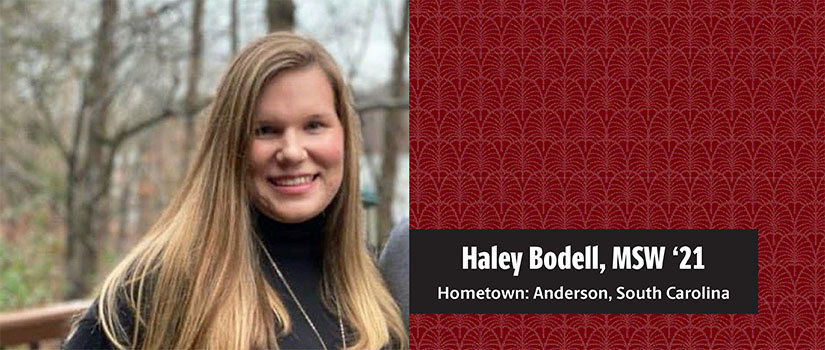Field education is an important component of the overall experience at the College of Social Work. Bachelor of Social Work students are assigned to a field location, beginning in the spring semester of their junior year. But Haley Bodell’s undergraduate field placement at Transitions Homeless Center almost never happened due to negative assumptions and beliefs.
Social work has become a perfect fit for Bodell, who is currently in the Master of Social Work Advanced Standing Program. She started as a cardiovascular technology major but knew she had to change majors after taking some sciences classes as a freshman. Bodell had begun seeing a counselor for anxiety while a senior in high school. But it was a counseling session with a new counselor in Columbia during her freshman year where she discovered her future academic and career path.
“The counselor I saw was a graduate of the College of Social Work’s MSW program. I told her that I was anxious about my future and what career path I wanted to take, but I knew that I wanted to help people. I just wasn’t sure where to go from there,” Bodell says. “She said that I would make a good social worker and that I should consider the UofSC BSW and MSW programs. I was eventually approved for the BSW Upper Division and started studying social work as a junior.”
Bodell prepared for her first field placement as she began the spring semester of her junior year in 2019. But there was one location where she feared would be her internship site.
“Even before we learned our field placements, I was thinking that if I was assigned to Transitions, it would be over for me,” Bodell says. “I cried when I learned it was Transitions and called my dad saying, ‘I can’t do this. They placed me where I don’t want to be.’”
Bodell’s parents, her counselor, and assistant Director of Field Education Jennifer Bosio-McArdle all told her that she at least had to give the initial interview a chance.
“I didn’t think I could work with the homeless population because I didn't know how to build rapport coming from a rather privileged background,” Bodell says. “I was still skeptical going to the introductory interview, fearing that something bad would eventually happen. But it ended up being one of the best experiences of my life.”
Bodell interned at Transitions until earning her Bachelor of Social Work degree last spring. She was responsible for coordination of morning intakes to ensure all clients received a bed for the night. She also worked with the veterans’ population and helped them find permanent housing, resources at the Veterans Administration, and led a job skills class.
“Talking with the clients was not as hard as I thought. I initially struggled with stigmas associated with the population, such as being a person experiencing homelessness and how they’re violent and only want my stuff,” Bodell says. “But I quickly saw them as people who want help, and I was here to help them. It’s important to treat them as a person and not this title that society has placed on them.”
According to Bodell, her time at Transitions went from “how will I relate to these people” to “how will I be able to leave this internship because I care so much about each client?”
“The clients had a big impact on me, and I would have never thought that would happen when I first started there,” Bodell says. “I thought I had nothing in common with my clients at first. But you find things in common and just being there and helping someone with just one thing meant the world to each of my clients.”
Bodell went from working with the homeless population to interning at her current site at Comfort Care Hospice. Her choice to work at a hospice facility and pursue a professional career working with older adults was based on her previous experiences at Transitions.
“I chose hospice because I enjoyed working with older adult clients at Transitions. Most of the veterans I worked with were 65 years and older, and I that’s where I found my passion,” Bodell says. “I figured I could work at a nursing home or at a hospice agency as an MSW student. I think hospice is the hardest type of work, and since I had never dealt with a death in my family, I wanted to experience and support people in their grieving period before I graduated.”
Similar to working with the homeless population at Transitions, Bodell has enjoyed hospice social work. It has been a smooth transition to a different population, thanks to being able to shadow her supervisor for a few weeks. And her initial fear of becoming attached to clients and crying every week has been debunked since she only sees most about twice a month, which was a change from the close relationships she built at Transitions. Working in hospice has also given her the opportunity to apply interventions that she learned in the classroom.
“For example, empathetic listening is one of the interventions we utilize,” Bodell says. “Putting interventions in place and learning which ones are specific to hospice social work has been the biggest takeaway for me.”
Bodell’s emotions before and during her field education experiences have ranged from fear and skepticism to satisfaction and fulfillment. She is grateful for the opportunities that will prepare her for a social work career.
“If I could go back as a BSW student, I would tell myself, ‘This is a learning opportunity and you'll thank yourself later,’" Bodell says. “Looking back, I’m thankful that I was placed at Transitions, where I was vulnerable, but it turned out to be a great learning experience. Thanks to that experience, I knew the type of population I wanted to work with and felt comfortable choosing to work with hospice clients.”
